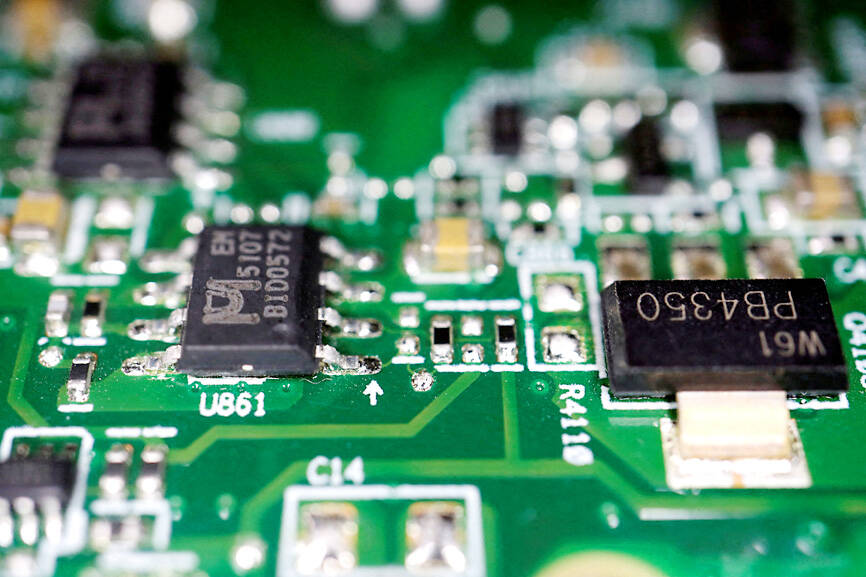Amkor Technology Inc plans to build a US$2 billion semiconductor advanced packaging facility in Arizona, an investment that could generate as many as 2,000 jobs and bolster the Phoenix region’s status as a US chipmaking hub.
The site, in the city of Peoria, is to start production within the next two to three years, the company said in a statement.
It will package chips made for Apple Inc at a US$40 billion fab that Taiwan Semiconductor Manufacturing Co (TSMC, 台積電) is building in Phoenix.

Amkor is the biggest outsourced provider of semiconductor assembly and testing in the US, and its Peoria plant would be the largest outsourced advanced packaging facility in the country, it said.
Globally, Amkor competes against Taiwan’s ASE Technology Holdings Co (日月光投控) and a coterie of other Asian players, with Malaysia being the international hub for such work.
The 22-hectare Peoria facility is one of more than two dozen announced chip investments in Arizona over the past few years, including a massive expansion by Intel Corp in Chandler.
Amkor has applied for Chips Act funding, the firm said in a statement, adding that federal support would be “critical to Amkor’s project moving forward.”
US Secretary of Commerce Gina Raimondo has said her agency plans to make the first awards by the end of this year.
The Amkor plant would help address a lack of US capacity in packaging — the “special sauce” in chipmaking, in Raimondo’s words, that is set to become the next big chips battleground between Washington and Beijing. The US houses just 3 percent of the world’s packaging capacity compared with China’s 38 percent.
“As one of the first advanced packaging facilities in the US, this is a huge step forward to reducing dependence on other countries in the microchip supply chain,” US Senator Mark Kelly said in a statement.
Apple and TSMC also issued statements of support, citing longstanding packaging partnerships with Amkor.
“We share Amkor’s excitement for its significant investment and the value this facility will bring to TSMC, our customers and the ecosystem,” TSMC chief executive officer C.C. Wei (魏哲家) said.
In Taiwan, the company has been working closely with ASE to meet the soaring demand for its CoWoS packaging. That has proven a bottleneck, constraining supply of Nvidia Corp’s class-leading artificial intelligence accelerators.
US President Joe Biden’s administration recently outlined a US$3 billion plan to stimulate the packaging industry. As the transistors on chips become so small that they push the limits of physics, innovation in the semiconductor sector will increasingly focus on how those chips are put together.
Without localized packaging, US-made chips would still have to be shipped to Asia for assembly, creating a supply-chain risk the US “just can’t accept,” US Under Secretary of Commerce Laurie Locascio said earlier this month.
South Korea’s SK Hynix Inc has also said that it plans to invest US$15 billion in a packaging facility in the US, but the company has not selected a site.

Real estate agent and property developer JSL Construction & Development Co (愛山林) led the average compensation rankings among companies listed on the Taiwan Stock Exchange (TWSE) last year, while contract chipmaker Taiwan Semiconductor Manufacturing Co (TSMC, 台積電) finished 14th. JSL Construction paid its employees total average compensation of NT$4.78 million (US$159,701), down 13.5 percent from a year earlier, but still ahead of the most profitable listed tech giants, including TSMC, TWSE data showed. Last year, the average compensation (which includes salary, overtime, bonuses and allowances) paid by TSMC rose 21.6 percent to reach about NT$3.33 million, lifting its ranking by 10 notches

SEASONAL WEAKNESS: The combined revenue of the top 10 foundries fell 5.4%, but rush orders and China’s subsidies partially offset slowing demand Taiwan Semiconductor Manufacturing Co (TSMC, 台積電) further solidified its dominance in the global wafer foundry business in the first quarter of this year, remaining far ahead of its closest rival, Samsung Electronics Co, TrendForce Corp (集邦科技) said yesterday. TSMC posted US$25.52 billion in sales in the January-to-March period, down 5 percent from the previous quarter, but its market share rose from 67.1 percent the previous quarter to 67.6 percent, TrendForce said in a report. While smartphone-related wafer shipments declined in the first quarter due to seasonal factors, solid demand for artificial intelligence (AI) and high-performance computing (HPC) devices and urgent TV-related orders

Prices of gasoline and diesel products at domestic fuel stations are this week to rise NT$0.2 and NT$0.3 per liter respectively, after international crude oil prices increased last week, CPC Corp, Taiwan (台灣中油) and Formosa Petrochemical Corp (台塑石化) said yesterday. International crude oil prices last week snapped a two-week losing streak as the geopolitical situation between Russia and Ukraine turned increasingly tense, CPC said in a statement. News that some oil production facilities in Alberta, Canada, were shut down due to wildfires and that US-Iran nuclear talks made no progress also helped push oil prices to a significant weekly gain, Formosa said

MINERAL DIPLOMACY: The Chinese commerce ministry said it approved applications for the export of rare earths in a move that could help ease US-China trade tensions Chinese Vice Premier He Lifeng (何立峰) is today to meet a US delegation for talks in the UK, Beijing announced on Saturday amid a fragile truce in the trade dispute between the two powers. He is to visit the UK from yesterday to Friday at the invitation of the British government, the Chinese Ministry of Foreign Affairs said in a statement. He and US representatives are to cochair the first meeting of the US-China economic and trade consultation mechanism, it said. US President Donald Trump on Friday announced that a new round of trade talks with China would start in London beginning today,